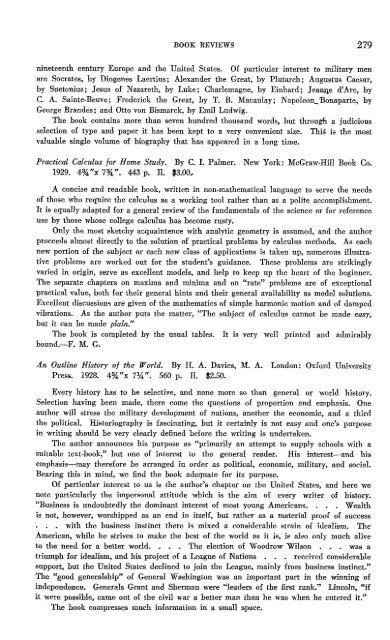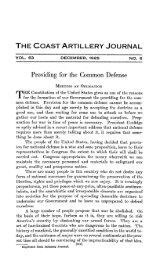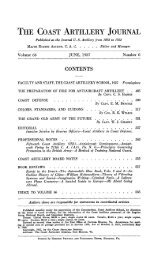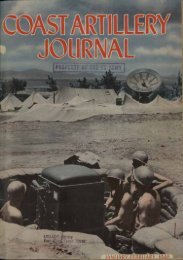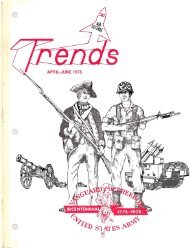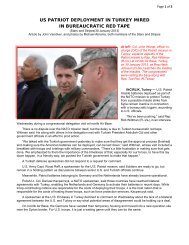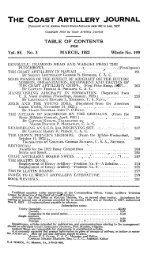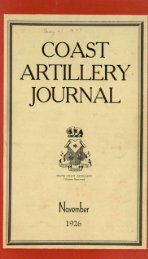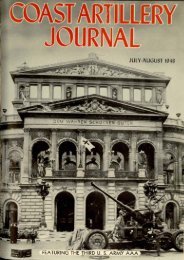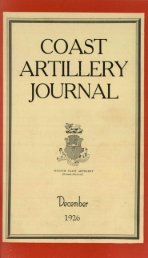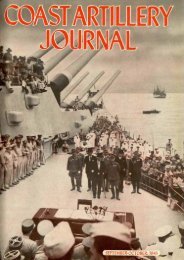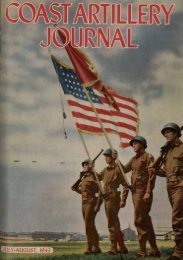THE COAST ARTILLERY JOURNAL - Air Defense Artillery
THE COAST ARTILLERY JOURNAL - Air Defense Artillery
THE COAST ARTILLERY JOURNAL - Air Defense Artillery
Create successful ePaper yourself
Turn your PDF publications into a flip-book with our unique Google optimized e-Paper software.
BOOK REVIEWS 279<br />
nineteenth century Europe and the United States. Of particular interest to military men<br />
are Socrates, by Diogenes Laertius; Alexander the Great, by Plutarch; Augustus Caesar,<br />
by Suetonius; Jesus of Nazareth, by Luke; Charlemagne, by Einhard; JeaWle d'Arc, by<br />
C. A. Sainte-Beuve; Frederick the Great, by T. B. Macaulay; Napoleon_'Bonaparte, by<br />
George Brandes; and Otto von Bismarck, by Emil Ludwig.<br />
The book contains more than seven hundred thousaud words, but through a judicious<br />
selection of type and paper it has been kept to a very convenient size. This is the most<br />
valuable single volume of biography that has appeared in a long time.<br />
Practical Calculus for Home Study. By C. I. Palmer. New York: McGraw-Hill Book Co.<br />
1929. 4%,"x 7%,". 443 p. ll. $3.00,<br />
A concise and readable book, written in non-mathematical language to serve the needs<br />
of those who require the calculus as a working tool rather than as a polite accomplishment.<br />
It is equally adapted for a general review of the fundamentals of the science or for reference<br />
use by those whose college calculus has become rusty.<br />
Only the most sketchy acquaintence with analytic geometry is assumed, and the author<br />
proceeds almost directly to the solution of practical problems by calculus methods. As each<br />
new portion of the snbject or each new class of applications is taken up, numerous illustra-<br />
tive problems are worked out for the student's guidance. These problems are strikingly<br />
varied in origin, serve as excellent models, and help to keep up the heart of the beginner.<br />
The separate chapters on maxima and minima and on "rate" problems are of exceptional<br />
practical value, both for their general hints and their general availability as model solutions.<br />
Excellent discussions are given of the mathematics of simple harmonic motion and of damped<br />
vibrations. As the author puts the matter, "The subject of calculus cannot be made easy,<br />
but it can be made plain."<br />
The book is completed by the usual tables. It is very well printed and admirably<br />
bound.-F. M. G.<br />
An Outline History of the World. By H. A. Davies, M. A. London: Oxford University<br />
Press. 1928. 4%,"x 714". 560 p. II. $2.50.<br />
Every history has to be selective, and none more so than general or world history.<br />
Selection having been made, there come the questions of proportion and emphasis. One<br />
author will stress the military development of nations, another the economic, and a third<br />
the political. Historiography is fascinating, but it certainly is not easy and one's purpose<br />
in writing should be very clearly defined hefore the writing is undertaken.<br />
The author announces his purpose as "primarily an attempt to supply schools with a<br />
suitable text-book," but one of interest to the general reader. His interest-and his<br />
emphasis-may therefore be arranged in order as political, economic, military, and social.<br />
Bearing this in mind, we find the hook adequate for its purpose.<br />
Of particular interest to us is the author's chapter on tbe United States, and here we<br />
note particularly the impersonal attitude which is the aim of every writer of history.<br />
"Business is undoubtedly the dominant interest of most young Americans .... WeaIth<br />
is not, however, worshipped as an end in itself, but rather as a material proof of success<br />
..• with the business instinct there i'1 mixed a considerable strain of idealism. The<br />
American, while he strives to make the best of the world as it is, is also only much alive<br />
to the need for a better world .••. The election of Woodrow Wilson ... was a<br />
triumph for idealism, and his project of a League of Nations .•. received considerable<br />
support, but the United States declined to join the League, mainly from business instinct."<br />
The "good generalship" of General Washington was an important part in the winning of<br />
independence. Generals Grant and Sherman were "leaders of the first rank." Lincoln, "if<br />
it were possible, came out of the civil war a hetter man than he was when he entered it."<br />
The book compresses much information in a small space.


